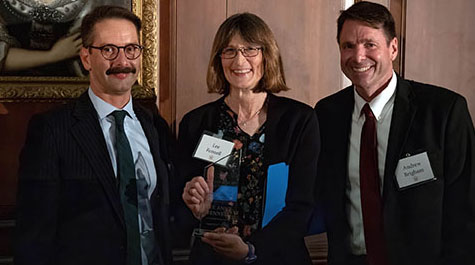Brigham-Kanner Property Rights Conference Celebrates 21st Year, Honors Professor Lee Fennell
William & Mary Law School hosted its annual Brigham-Kanner Property Rights Conference on September 12-13, bringing together members of the bench, bar and academia from around the country for a series of thought-provoking panel discussions.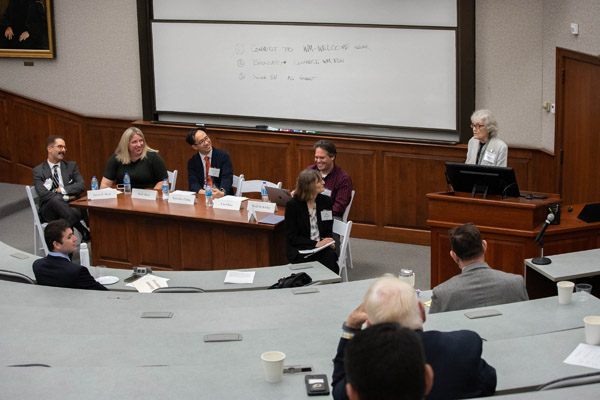
Now in its 21st year, the conference kicked off with the annual banquet and award presentation held in the Great Hall of William & Mary’s historic Sir Christopher Wren Building (1695), the oldest college building still standing in the United States.
“The first of these dinners took place in this same room 21 years ago,” said James Y. Stern, Professor of Law at William & Mary Law School and Director of William & Mary’s Property Rights Project. “That milestone is a testament to the contributions of so many people who believed in the program.”
Each year during the banquet, the Brigham-Kanner Property Rights Prize is awarded to an individual whose work has advanced the cause of property rights and has contributed to the overall awareness of the important role property rights occupy in the broader scheme of individual liberty. This year’s award recipient was Lee Anne Fennell, Max Pam Professor of Law at the University of Chicago Law School.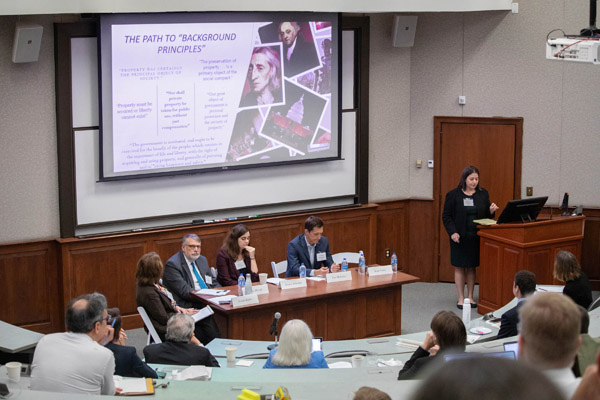
As he presented the award, Stern noted that Professor Fennell has averaged close to four publications per year over the course of her career.
“Her work is also influential, placing her among the top five most-cited property scholars in the property field in the American legal academy today,” Stern said. “A glance at the catalog of her writings testifies to not only her incredible productivity, but also her versatility, imagination, and intellectual curiosity.”
Stern praised Fennell for looking at property law with fresh and penetrating eyes.
“Within the community of scholars whose work engages with property law, her writings are essential reading,” he said. “In article after article, she has helped shed new light on this ancient and universal institution, and in doing so helped ensure its vitality in the years to come.”
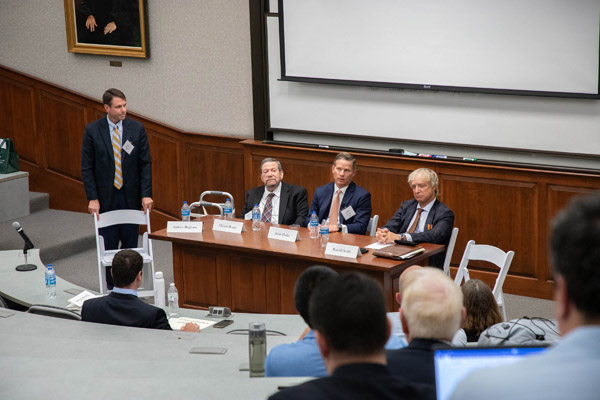 Fennell joined the University of Chicago Law School faculty in 2007, having previously served as a Bigelow Fellow from 1999 to 2001. In the intervening years, she taught at the University of Texas School of Law from 2001 to 2004 and at the University of Illinois College of Law from 2004 to 2007. She has also held visiting positions at Yale Law School, NYU School of Law, and the University of Virginia School of Law. She received her J.D. magna cum laude from Georgetown University Law Center in 1990. Before teaching law, she practiced at Pettit & Martin, the State and Local Legal Center, and the Virginia School Boards Association.
Fennell joined the University of Chicago Law School faculty in 2007, having previously served as a Bigelow Fellow from 1999 to 2001. In the intervening years, she taught at the University of Texas School of Law from 2001 to 2004 and at the University of Illinois College of Law from 2004 to 2007. She has also held visiting positions at Yale Law School, NYU School of Law, and the University of Virginia School of Law. She received her J.D. magna cum laude from Georgetown University Law Center in 1990. Before teaching law, she practiced at Pettit & Martin, the State and Local Legal Center, and the Virginia School Boards Association.
Fennell’s teaching and research interests include property, torts, land use, housing, social welfare law, state and local government law, and public finance. She is the author of “The Unbounded Home: Property Values Beyond Property Lines” (Yale University Press 2009) and “Slices and Lumps: Division and Aggregation in Law and Life” (University of Chicago Press, 2019), as well as many articles and essays.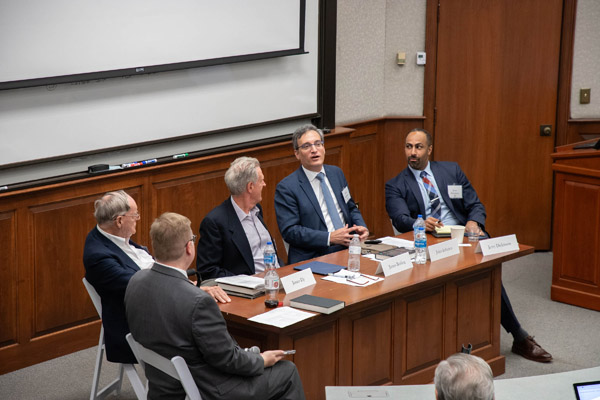
Upon accepting the Property Rights Prize, Fennell said that spending time in myriad places through the years piqued her interest in how property can work better for complex systems like large and interconnected cities and ecosystems. In the process, she tried to learn more about what sorts of interconnectedness matter most for humans and other animals, and what forms of adaptability and property forms can best serve needs going forward.
“We can’t make any headway on property as an institutional response to interdependent systems without practicing interdependence ourselves, getting together and sharing knowledge and ideas,” Fennell said. “And I can’t imagine any better place to do that than at this conference, which throws together a bunch of people who can’t get property out of their systems.”
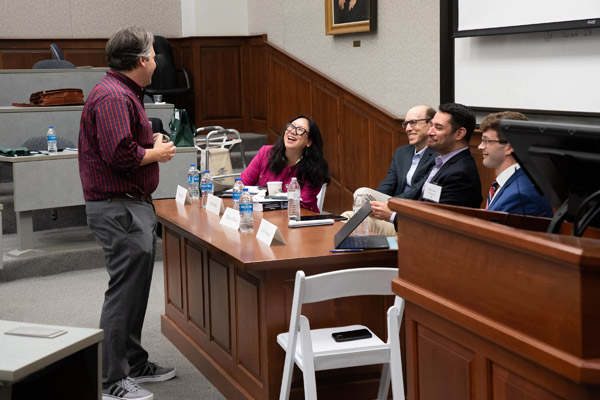 Fennell said she was “incredibly honored, amazed, and delighted” to be receiving the Brigham-Kanner Prize. “It’s an astonishing privilege to be joining the ranks of all of the esteemed past winners and all of the esteemed future winners of this wonderful award, and I am so grateful to be celebrating with all of you in this incredibly old room.”
Fennell said she was “incredibly honored, amazed, and delighted” to be receiving the Brigham-Kanner Prize. “It’s an astonishing privilege to be joining the ranks of all of the esteemed past winners and all of the esteemed future winners of this wonderful award, and I am so grateful to be celebrating with all of you in this incredibly old room.”
The next morning, William & Mary Law School’s Dean A. Benjamin Spencer opened the day-long panel discussions with a look back at the conference’s first two decades, even as he looked ahead to a strong future.
“Over the past 20 years we have hosted giants in the world of property rights, starting with the late Toby Prince Brigham and Gideon Kanner,” Spencer said. “And it is the giants whom we honor every year and from whom we learn so much.”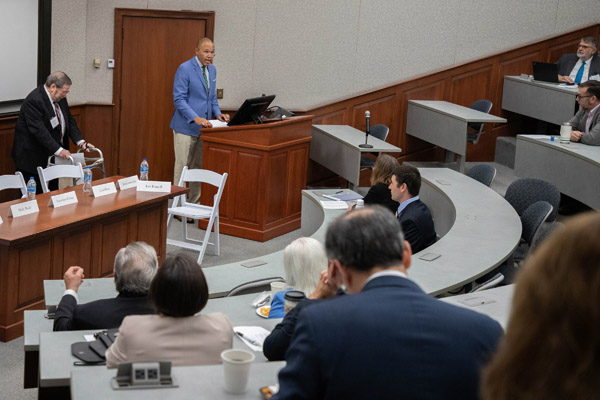
Spencer then introduced Michael Berger, winner of the 2014 Brigham-Kanner Prize, who shared heartfelt remembrances of Gideon Kanner, who passed away in November 2023. A series of panel discussions followed, covering such topics as “Restructuring Property: A Tribute to Lee Fennell,” “Background Principles, General Law, & Constitutional Property,” “Roundtable: Unfinished Business & Emerging Issues,” “Property Rights and The Housing Crisis,” and “Government Trespass: The Open Fields Doctrine Turns 100.”
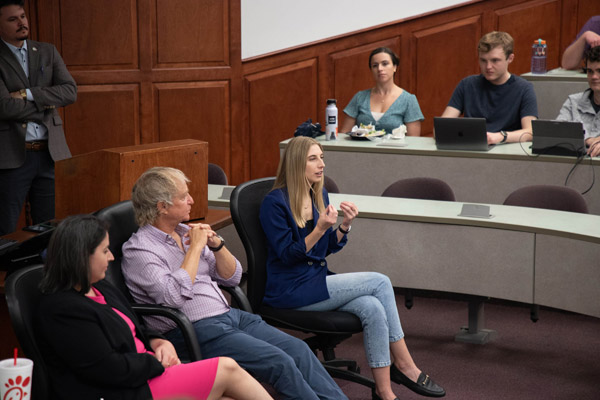 A highlight of this year’s event was a preconference lunchtime session, “Practice Perspective,” where students met with property rights practitioners who shared good advice, how they got started, and tips for new lawyers.
A highlight of this year’s event was a preconference lunchtime session, “Practice Perspective,” where students met with property rights practitioners who shared good advice, how they got started, and tips for new lawyers.
The conference concluded with a reception and slideshow honoring Gideon Kanner, and presented many opportunities for students to network with the experts.
***
Hosted by William & Mary Law School since its inception, the Property Rights conference benefits from the financial and logistical support of several stalwarts, including conference founder Joseph T. Waldo ’78, Robert R. Kinser ’78 who helped underwrite the dinner, and Andrew Prince Brigham, Chairman of the Conference’s Advisory Committee.
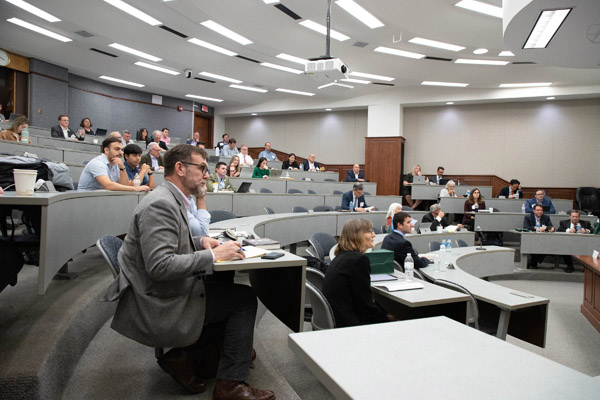 The conference has taken on a larger international perspective as more and more countries deal with property rights issues. In 2011, the conference was held at Tsinghua Law School in Beijing, China, and in 2016 at the Grotius Center of International Legal Studies at the World Court in The Hague, Netherlands. Future international events are being planned.
The conference has taken on a larger international perspective as more and more countries deal with property rights issues. In 2011, the conference was held at Tsinghua Law School in Beijing, China, and in 2016 at the Grotius Center of International Legal Studies at the World Court in The Hague, Netherlands. Future international events are being planned.
Recipients of the Brigham-Kanner Property Rights Prize include Frank I. Michelman (2004), Richard Epstein (2005), James W. Ely, Jr. (2006), Margaret Jane Radin (2007), Robert C. Ellickson (2008), Richard E. Pipes (2009), Carol M. Rose (2010), Sandra Day O’Connor (2011), James E. Krier (2012), Thomas W. Merrill (2013), Michael M. Berger (2014), Joseph William Singer (2015), Hernando de Soto (2016), David L. Callies (2017), Stewart E. Sterk (2018), Steven J. Eagle (2019), Henry Smith (2020), Vicki Been (2021), James S. Burling (2022), Gregory S. Alexander (2023), and Lee Fennell (2024).
Papers from the conference will be published in Volume 13 (2024) of the Brigham-Kanner Property Rights Journal, published by the William & Mary Law School Property Rights Project.
Learn more about the William & Mary Law School Property Rights Project.
